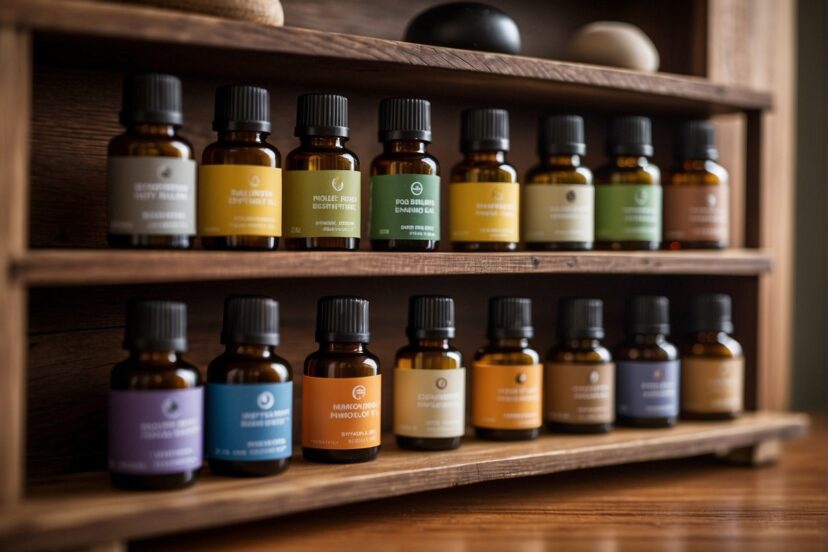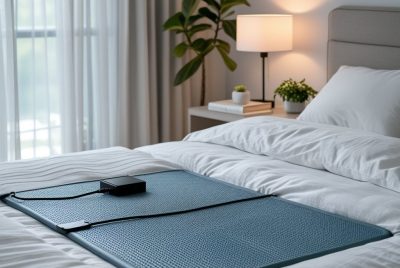Best Essential Oil Brands: Top-Quality Aromatherapy
*We may earn a commission for purchases made using our links. Please see our disclosure to learn more.
Best Essential Oil Brands: Your Guide to Top-Quality Aromatherapy
Let’s jump into my personal journey in my search for the best essential oil brands. In exploring the world of essential oils, understanding the value and quality of different brands is paramount. My experience has shown that essential oils have become increasingly popular for their potential health benefits and aromatic qualities. They’re used in various applications—from aromatherapy to skincare, and even in natural cleaning products. Consumers are often looking for 100% pure, high-quality essential oils to ensure they’re getting the full benefits the oils have to offer without any synthetic additives.

With a multitude of options at hand, it can be challenging to determine the best essential oil brands. Some of the leading companies have built their reputations through rigorous quality testing and by sourcing their oils from the native regions where the plants thrive. Brands like Young Living have established themselves through a combination of product variety and commitment to quality. They span a global market by distributing a wide array of essential oils that cater to those seeking both individual oils and exclusive blends.
My goal is to help consumers navigate this abundant market by providing insights into what makes a reputable essential oil brand. Whether it’s solitary oils like lavender, tea tree, and lemon, or unique blends formulated for energy, relaxation, or wellness, I aim to identify brands that stand out because of their product purity, sustainability practices, and customer satisfaction. Identifying these key factors matters because they significantly influence the overall efficacy and enjoyment of using essential oils in our daily lives.
Exploring the Best Essential Oil Brands

When searching for the best essential oil brands, it’s paramount to prioritize quality and purity. Brands that commit to offering 100% pure, therapeutic-grade oils provide the most benefit and safest use. From my research, doTERRA and Young Living consistently stand out in the market due to their stringent quality standards and extensive range.
doTERRA is renowned for its Certified Pure Therapeutic Grade (CPTG) essential oils, which undergo rigorous testing to ensure purity. Their commitment to sourcing the best materials across the globe makes them a trusted choice for consumers.
Young Living prides itself on their Seed to Seal® promise, which reflects their control over every step of production. This level of quality control is a testament to their commitment to delivering high-quality essential oils.
Rocky Mountain Oils (RMO) offers an impressive variety, including organic lines and blends tailored for specific needs, like the Attention Assist. Their transparency with GC-MS test results, responsible sourcing from small farms, and eco-friendly packaging initiatives make RMO a leading brand in the industry.
NOW Essential Oils is another brand that garners respect for providing an extensive range of pure and quality oils at affordable prices. Similarly, Aura Cacia is noted for its purity standards and value.
For those interested in sleek design and modern aesthetics, Vitruvi boasts beautiful diffusers and high-quality blends. Jade Bloom, on the other hand, is recognized for their commitment to high-quality at a lower price point.
Here’s a summarizing table of the brands mentioned:
| Brand | Quality Feature | Products Known For |
| doTERRA | CPTG certified | Single oils, Blends |
| Young Living | Seed to Seal® guarantee | Single oils, Home products |
| Rocky Mountain Oils | GC-MS testing | Organic oils, Attention Assist |
| NOW Essential Oils | Purity and affordability | Array of single and blended oils |
| Aura Cacia | Commitment to pure oils | Essential oil discovery kits |
| Vitruvi | Design and quality | Diffusers and blends |
| Jade Bloom | Quality with competitive pricing | Single oils, Blends |
In my experience, each of these brands has something unique to offer, whether that’s a focus on purity, a commitment to ethical sourcing, or thoughtful packaging and presentation.
Best Essential Oil Brands: Quality and Purity Standards

As an expert in aromatherapy, I know that the quality and purity of essential oils are paramount. Consumers should look for high-quality essential oils that are pure, potent, and backed by rigorous testing and certification.
Testing and Certification of the Best Essential Oil Brands
I always emphasize that reputable brands employ GC-MS testing (Gas Chromatography-Mass Spectrometry) to ensure their oils’ purity and quality. This is the gold standard for analyzing essential oil components. Certified Pure Tested Grade is a mark of quality control that some brands like doTERRA use to signify that their oils have passed stringent tests.
- Testing Methods: GC-MS testing, organoleptic testing
- Certification Labels: Certified Pure Tested Grade (CPTG), organic certifications
Plant Sources and Extraction
My insights tell me that the best essential oils come from properly identified plant species and are extracted using methods that preserve their potency. Look for oils derived from their indigenous locations, which can contribute to the oil’s therapeutic qualities.
- Source Locations: Detailed on the label
- Extraction Methods: Steam distillation, cold pressing
Labeling and Ingredient Transparency
In my experience, I’ve found that clear labeling is a sign of a trustworthy brand. Labels should detail the oil’s common and Latin name, the part of the plant used, and the extraction method. Ingredient transparency is a key indicator of quality oils and builds consumer trust.
- Label Information: Common name, Latin name, plant part, extraction method
- Transparency Aspects: No additives, 100% essential oil contents
Benefits of Essential Oils

In my experiences, essential oils provide a plethora of benefits for both mental wellness and physical health when used appropriately in aromatherapy and topical applications.
Aromatherapy and Mental Wellness
Aromatherapy utilizes essential oils to improve mental well-being. For example, studies suggest lavender oil can promote better sleep and help in managing anxiety. The scent of bergamot is noted for its ability to help enhance focus and relaxation. Here’s a brief list of essential oils with their aromatherapy benefits:
- Lavender: Aids sleep, reduces anxiety
- Peppermint: Boosts energy, improves focus
- Eucalyptus: Clears the mind, promotes relaxation
Topical Use and Physical Health
When applied topically after proper dilution, essential oils can contribute to physical health. I must stress that dilution with a carrier oil is key to safe topical use. For instance:
- Tea Tree Oil: Known for its antibacterial properties, beneficial for skin issues
- Chamomile: Soothes skin irritations, promotes wound healing
- Frankincense: May reduce the appearance of wrinkles and promote cellular health
Both the psychological and physical benefits of essential oils underscore their versatility in promoting overall well-being.
Safe Usage and Best Practices

When using essential oils, it’s crucial to prioritize safety and adhere to best practices to ensure a positive and healthful experience. Employing proper dilution methods, understanding the nuances of diffuser use, and considering the needs of sensitive groups such as children and pregnant women, are all essential to the safe enjoyment of these potent botanical extracts.
Dilution with Carrier Oils
Essential oils are highly concentrated and can cause irritation if applied directly to the skin without proper dilution. My recommendation is to mix essential oils with a carrier oil before topical application. Common carrier oils include:
- Jojoba Oil: Mimics the skin’s natural oils.
- Coconut Oil: Moisturizes while it dilutes.
- Almond Oil: Lightweight and easily absorbed.
A standard dilution ratio is 1-2 drops of essential oil to one teaspoon of carrier oil. This ratio may vary depending on the specific oil and its intended use.
Usage in Diffusers
Diffusing essential oils is a popular method for inhalation. I always ensure the diffuser is clean and follow the manufacturer’s instructions. For most oils, including lavender and eucalyptus, I find that 3-5 drops per 100ml of water work effectively. Diffusers should be used in well-ventilated areas, and diffusing intermittently (30 minutes on, 30 minutes off) can prevent overexposure.
Considerations for Sensitive Groups
Some essential oils like peppermint and eucalyptus should be used with caution, especially around sensitive groups:
- Children: Only certain oils are safe for children, and they must be properly diluted. For example, lavender can be soothing for children, but always in a lower concentration.
- Pregnancy: Pregnant women should avoid some essential oils entirely. It’s best to consult with a healthcare provider first.
- Pets: Many essential oils are toxic to pets. I never use oils like peppermint and eucalyptus around my pets and keep all essential oils and diffusers out of their reach.
When used responsibly, essential oils can be a safe addition to my wellness routine. It is important to source oils from reputable brands and consult with a professional for any uncertainties regarding their use.
Product Range and Accessibility

I find that when navigating the diverse landscape of essential oils, two key facets stand out: the variety of products offered and the ease with which consumers can obtain them. My assessment of brands and their offerings gives insight into single oils versus blends, price points, and the additional products that augment the aromatherapy experience.
Single Oils vs. Blends
Single Oils: I always look for companies that offer a broad selection of single essential oils, as they serve as the foundation for any aromatherapy endeavor. A brand like Now Foods is a perfect example, providing a comprehensive range of single oils, harnessing benefits for everything from relaxation to homemade cleaning.
Blends: Conversely, blends offer a synergistic approach to wellness, combining multiple oils for a targeted effect. Brands often create proprietary blends designed for specific purposes such as boosting mood or releasing stress. Consumers seeking convenience and ease of use frequently turn to blends.
Best Essential Oil Brands and Price and Affordability
Affordable Options: It’s a common misconception that high price equals high quality in the essential oil market. In my experience, companies such as Now Foods have demonstrated that it’s possible to maintain purity and quality without exorbitant costs, making essential oils accessible at a fair price.
High-End Oils: While more affordable oils are widely available, the higher-end market is also thriving. Certain premium brands justify their higher prices with claims of superior sourcing or proprietary extraction processes. As a consumer, it’s crucial to weigh the price against the perceived value of these premium options.
Accessories and Related Products
Finally, I consider the accessory and related product offerings to be a significant aspect of a brand’s range and accessibility. From diffusers to topical application tools, the best essential oil companies often provide accessories that enhance the usage of their oils.
DIY and Wellness Accessories: Brands that cater to a community interested in natural products and DIY solutions frequently offer kits and accessories, which can include empty bottles for mixing blends or educational materials.
Through my exploration, these dynamics—product range, price, and related accessories—form the core considerations when choosing an essential oil company that aligns with my needs for quality, affordability, and wellness enrichment.
Frequently Asked Questions
When exploring essential oils, it’s crucial to consider purity, quality, application methods, and brand reputation. These FAQs are designed to help you make informed choices.
1. What should I consider when choosing a quality essential oil brand?
I consider factors such as the source of the plants used to make the oils, the distillation process, and whether the company performs rigorous testing. Reputable brands often provide detailed information about their sourcing and testing protocols.
2. How do I determine the purity of essential oils offered by different brands?
I look for brands that use third-party testing and share their GC-MS test results, which can reveal the chemical composition of the essential oil to ensure its purity and to confirm the absence of additives or contaminants.
3. What are the distinguishing factors between high and low-quality essential oil brands?
High-quality brands typically offer complete transparency about their oil sourcing, production methods, and testing. They also tend to have a commitment to ethical practices and sustainability. On the other hand, lower quality may manifest as inconsistency in aroma and effectiveness and might lack proper documentation.
4. Can you recommend essential oil brands that are well-suited for diffusers?
Young Living and Rocky Mountain Oils are brands that I find to be well-suited for diffusers due to their extensive range of blends and the high purity of their oils, which are ideal for aromatherapy use.
5. Which essential oil brands are recommended for skincare purposes?
For skincare, I recommend brands like Plant Therapy and Vthrive from The Vitamin Shoppe because they offer USDA-certified organic oils, which are less likely to cause skin irritation and are suitable for beauty regimes.




